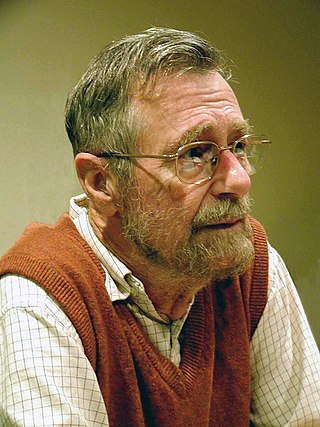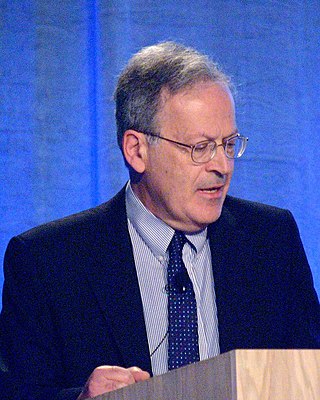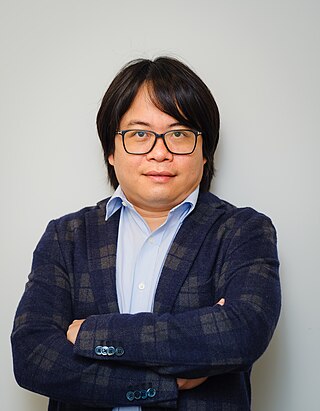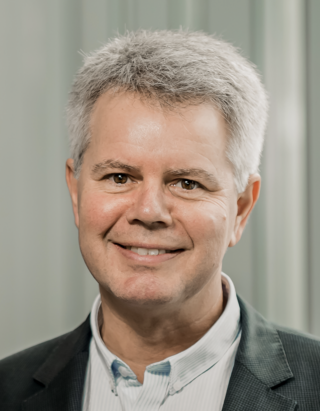Related Research Articles
The Association for Computing Machinery (ACM) is a US-based international learned society for computing. It was founded in 1947 and is the world's largest scientific and educational computing society. The ACM is a non-profit professional membership group, claiming nearly 110,000 student and professional members as of 2022. Its headquarters are in New York City.
The Capability Maturity Model (CMM) is a development model created in 1986 after a study of data collected from organizations that contracted with the U.S. Department of Defense, who funded the research. The term "maturity" relates to the degree of formality and optimization of processes, from ad hoc practices, to formally defined steps, to managed result metrics, to active optimization of the processes.

Edsger Wybe Dijkstra was a Dutch computer scientist, programmer, software engineer, and science essayist.

Peter James Denning is an American computer scientist and writer. He is best known for pioneering work in virtual memory, especially for inventing the working-set model for program behavior, which addressed thrashing in operating systems and became the reference standard for all memory management policies. He is also known for his works on principles of operating systems, operational analysis of queueing network systems, design and implementation of CSNET, the ACM digital library, and codifying the great principles of computing. He has written numerous influential articles and books, including an overview of fundamental computer science principles, computational thinking, and his thoughts on innovation as a set of learnable practices.
Peter Pin-Shan Chen is a Taiwanese American computer scientist. He is a (retired) distinguished career scientist and faculty member at Carnegie Mellon University and Distinguished Chair Professor Emeritus at LSU. He is known for the development of the entity–relationship model in 1976.
Stages-of-growth model is a theoretical model for the growth of information technology (IT) in a business or similar organization. It was developed by Richard L. Nolan during the early 1970s, and with the final version of the model published by him in the Harvard Business Review in 1979.

Robert Stanley "Bob" Barton was the chief architect of the Burroughs B5000 and other computers such as the B1700, a co-inventor of dataflow architecture, and an influential professor at the University of Utah.

Leslie Gabriel Valiant is a British American computer scientist and computational theorist. He was born to a chemical engineer father and a translator mother. He is currently the T. Jefferson Coolidge Professor of Computer Science and Applied Mathematics at Harvard University. Valiant was awarded the Turing Award in 2010, having been described by the A.C.M. as a heroic figure in theoretical computer science and a role model for his courage and creativity in addressing some of the deepest unsolved problems in science; in particular for his "striking combination of depth and breadth".
Computational thinking (CT) refers to the thought processes involved in formulating problems so their solutions can be represented as computational steps and algorithms. In education, CT is a set of problem-solving methods that involve expressing problems and their solutions in ways that a computer could also execute. It involves automation of processes, but also using computing to explore, analyze, and understand processes.

Cynthia Dwork is an American computer scientist best known for her contributions to cryptography, distributed computing, and algorithmic fairness. She is one of the inventors of differential privacy and proof-of-work.
Bill Curtis is a software engineer best known for leading the development of the Capability Maturity Model and the People CMM in the Software Engineering Institute at Carnegie Mellon University, and for championing the spread of software process improvement and software measurement globally. In 2007 he was elected a Fellow of the Institute of Electrical and Electronics Engineers (IEEE) for his contributions to software process improvement and measurement. He was named to the 2022 class of ACM Fellows, "for contributions to software process, software measurement, and human factors in software engineering".
Stefano Ceri is an Italian computer engineer and professor of database management at Politecnico di Milano. He has been visiting professor at Stanford University between 1983 and 1990, and received the ACM SIGMOD Edward Codd Innovations Award in 2013.

Opher Etzion is an Israeli author and computer scientist. He has been instrumental in the development of the complex event processing area of computer science.
Eric S. Roberts is an American computer scientist noted for his contributions to computer science education through textbook authorship and his leadership in computing curriculum development. He is a co-chair of the ACM Education Council, former co-chair of the ACM Education Board, and a former member of the SIGCSE Board. He led the Java task force in 1994. He was a Professor emeritus at Stanford University. He currently teaches at Willamette University in Salem, Oregon.
Michael Justin Kearns is an American computer scientist, professor and National Center Chair at the University of Pennsylvania, the founding director of Penn's Singh Program in Networked & Social Systems Engineering (NETS), the founding director of Warren Center for Network and Data Sciences, and also holds secondary appointments in Penn's Wharton School and department of Economics. He is a leading researcher in computational learning theory and algorithmic game theory, and interested in machine learning, artificial intelligence, computational finance, algorithmic trading, computational social science and social networks. He previously led the Advisory and Research function in Morgan Stanley's Artificial Intelligence Center of Excellence team, and is currently an Amazon Scholar within Amazon Web Services.
Richard Emil Ladner is an American computer scientist known for his contributions to both theoretical computer science and assistive technology. Ladner is a professor emeritus at the University of Washington.

Pan Hui is a computer scientist at the University of Helsinki and The Hong Kong University of Science and Technology. He was elected as an International Fellow of the Royal Academy of Engineering (FREng) in 2020, a Fellow of the Institute of Electrical and Electronics Engineers (FIEEE), a Member of the Academia Europaea (MAE), and a Distinguished Scientist of the Association for Computing Machinery (ACM). He has been elected to the endowed professorship Nokia Chair in Data Science.
Richard Masao Fujimoto is a computer scientist and researcher in reverse computation, distributed computing, and big data. He is a Regents’ Professor, Emeritus, in the School of Computational Science and Engineering (CSE) at the Georgia Institute of Technology. He was also the founding chair of Georgia Tech's school of CSE. Fujimoto's research has provided the basis for the development of new algorithms and computational techniques for discrete event simulations, including the development of the Georgia Tech Time Warp software, which was adopted for use by MITRE to create a commercial air traffic simulator. Fujimoto also led the development and definition of the time management services in the High Level Architecture (HLA) for modeling and simulation which was standardized under IEEE 1516.
Richard Walter Conway is an American industrial engineer and computer scientist who is the Emerson Electric Company Professor of Manufacturing Management, Emeritus in the Johnson Graduate School of Management at Cornell University. Conway has spent his entire academic career, both as a student and a professor, at Cornell and has held faculty positions at Cornell in several different areas: industrial engineering, operations research, computer science, and management science. He is especially known for his work and publications in foundational questions about computer simulation methodology; in writing about production scheduling theory; in developing computer languages and language compilers, including the widely used PL/C dialect of IBM's PL/I language; in authoring or co-authoring textbooks about computer programming; and in developing simulation software for manufacturing. He was also the first director of the Office of Computing Services at Cornell.

Danish computer scientist Michael Edelgaard Caspersen has spent his academic life furthering computer science education, at all levels. His research interests are computing education, programming didactics, programming methodology, and object-oriented programming. He is best known for his work on computing education research and development, particularly his work to promote informatics as a fundamental discipline for all.
References
- ↑ Nolan, Richard, 1974, 1982. Managing the Data Resource Function. St. Paul, Minnesota, West Publishing. ISBN 0-8299-0003-9 (1982 ed.)
- ↑ Nolan, Richard (July 1973). "Managing the computer resource: a stage hypothesis". Communications of the ACM. Association for Computing Machinery. 16 (7): 399–405. doi: 10.1145/362280.362284 . S2CID 14053595.
- ↑ Nolan, Richard (July 1973). "Managing the computer resource: a stage hypothesis". Communications of the ACM. Association for Computing Machinery. 16 (7): 399–405. doi: 10.1145/362280.362284 . S2CID 14053595 . Retrieved 2007-07-27.